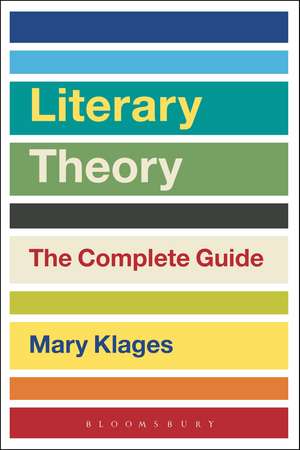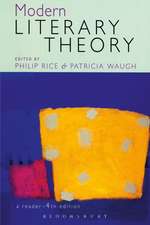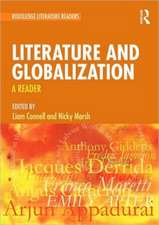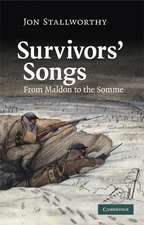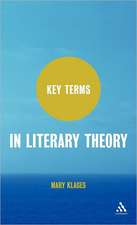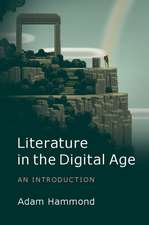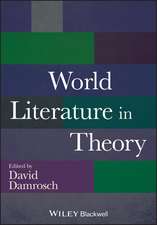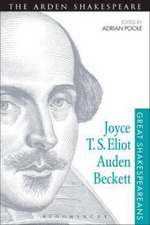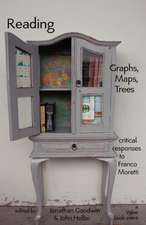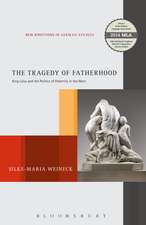Literary Theory: The Complete Guide
Autor Mary Klagesen Limba Engleză Paperback – 8 feb 2017
| Toate formatele și edițiile | Preț | Express |
|---|---|---|
| Paperback (2) | 141.61 lei 3-5 săpt. | +37.74 lei 5-11 zile |
| Bloomsbury Publishing – 8 feb 2017 | 141.61 lei 3-5 săpt. | +37.74 lei 5-11 zile |
| Bloomsbury Publishing – 22 noi 2006 | 144.57 lei 6-8 săpt. | |
| Hardback (2) | 541.20 lei 6-8 săpt. | |
| Bloomsbury Publishing – 8 feb 2017 | 541.20 lei 6-8 săpt. | |
| Bloomsbury Publishing – 22 noi 2006 | 566.10 lei 6-8 săpt. |
Preț: 141.61 lei
Preț vechi: 149.46 lei
-5% Nou
Puncte Express: 212
Preț estimativ în valută:
27.10€ • 28.19$ • 22.37£
27.10€ • 28.19$ • 22.37£
Carte disponibilă
Livrare economică 24 martie-07 aprilie
Livrare express 08-14 martie pentru 47.73 lei
Preluare comenzi: 021 569.72.76
Specificații
ISBN-13: 9781472592743
ISBN-10: 1472592743
Pagini: 296
Dimensiuni: 156 x 234 x 24 mm
Greutate: 0.73 kg
Ediția:2
Editura: Bloomsbury Publishing
Colecția Bloomsbury Academic
Locul publicării:London, United Kingdom
ISBN-10: 1472592743
Pagini: 296
Dimensiuni: 156 x 234 x 24 mm
Greutate: 0.73 kg
Ediția:2
Editura: Bloomsbury Publishing
Colecția Bloomsbury Academic
Locul publicării:London, United Kingdom
Caracteristici
Brings together the bestselling Literary Theory: A Guide for the Perplexed and Key Terms in Literary Theory in one fully integrated, substantially revised, updated and expanded introductory volume
Notă biografică
Mary Klages is Associate Professor of English at the University of Colorado at Boulder, USA. Her publications include Literary Theory: A Guide for the Perplexed (Bloomsbury, 2006) and Key Terms in Literary Theory (Bloomsbury, 2011).
Cuprins
Introduction: Humanist Literary Theory1. Structuralism2. Deconstruction3. Psychoanalysis4. Feminist Theories5. Queer Theories6. Ideology and Discourse7. Race and Postcolonialism8. Ecocriticism9. Postmodernism10. Biographies11. TermsIndex
Recenzii
This is a useful and realistically priced item for the student at (above all) college and first-/second-year university levels, and will hold its own against numerous competitors (above all in the area of philosophical ideas ... A successful attempt has been made to guide students in what class discussions might offer them, how themes might be followed-up in personal research; and beyond that, how tutors and teachers might develop and incorporate ideas and research inquiries into their teaching programmes.
Klages's third work on literary theory combines, often word-for-word, text from her first two works, Key Terms in Literary Theory (CH, Dec'12, 50-1817) and Literary Theory: A Guide for the Perplexed (CH, Sep'07, 45-0121). The present work is "complete" in the sense that, as the author writes, it acts as "a complete guide to literary theory" (italics hers) as she teaches it at the University of Colorado, Boulder. In the five-page introduction, Klages deftly condenses thousands of years of literary theory into an easy-to-understand explanation. Klages goes on to examine particular literary theory movements from the 19th century to the present. Chapters (which are roughly 20 pages) discuss key ideas and thinkers of each movement. The most useful addition to this volume are the teacher's notes that accompany each chapter. In these notes Klages analyzes Shakespeare's Hamlet through the lens of the theory discussed. The two concluding sections offer biographies of literary theorists and definitions of literary theory terms . Summing Up: Recommended.
This book provides a very comprehensive and approachable overview. It reads easily and it does not fall prey to jargon. The 'teacher's notes' are also quite clear and illustrate aptly how critical theory may be used.
Klages's third work on literary theory combines, often word-for-word, text from her first two works, Key Terms in Literary Theory (CH, Dec'12, 50-1817) and Literary Theory: A Guide for the Perplexed (CH, Sep'07, 45-0121). The present work is "complete" in the sense that, as the author writes, it acts as "a complete guide to literary theory" (italics hers) as she teaches it at the University of Colorado, Boulder. In the five-page introduction, Klages deftly condenses thousands of years of literary theory into an easy-to-understand explanation. Klages goes on to examine particular literary theory movements from the 19th century to the present. Chapters (which are roughly 20 pages) discuss key ideas and thinkers of each movement. The most useful addition to this volume are the teacher's notes that accompany each chapter. In these notes Klages analyzes Shakespeare's Hamlet through the lens of the theory discussed. The two concluding sections offer biographies of literary theorists and definitions of literary theory terms . Summing Up: Recommended.
This book provides a very comprehensive and approachable overview. It reads easily and it does not fall prey to jargon. The 'teacher's notes' are also quite clear and illustrate aptly how critical theory may be used.
